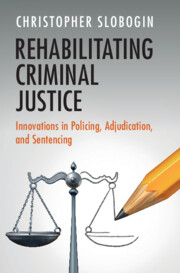Book contents
- Rehabilitating Criminal Justice
- Rehabilitating Criminal Justice
- Copyright page
- Contents
- Tables
- Preface
- Part I Policing
- 1 Equality in the Streets
- 2 Police ≠ Community Caretakers
- 3 Making Interrogation Transparent
- 4 Holding Police and Criminals Accountable
- Part II Adjudication
- Part III Post-conviction
- Notes
- Index
2 - Police ≠ Community Caretakers
from Part I - Policing
Published online by Cambridge University Press: 17 April 2025
- Rehabilitating Criminal Justice
- Rehabilitating Criminal Justice
- Copyright page
- Contents
- Tables
- Preface
- Part I Policing
- 1 Equality in the Streets
- 2 Police ≠ Community Caretakers
- 3 Making Interrogation Transparent
- 4 Holding Police and Criminals Accountable
- Part II Adjudication
- Part III Post-conviction
- Notes
- Index
Summary
Chapter 2 confronts another common police practice, often called “caretaking,” that involves searches purportedly carried out to provide aid to citizens. Because these searches can be used as pretexts to carry out illegitimate and sometimes deadly agendas, this practice too needs to be curtailed. The seeds for doing so are found in Caniglia v. Strom, the recent Supreme Court decision rejecting a freestanding caretaker exception to the Fourth Amendment warrant requirement. Properly construed, Caniglia would significantly limit police-initiated searches and seizures for benign or “regulatory” purposes unrelated to criminal law enforcement. This interpretation also provides doctrinal support for the fledgling movement to de-police those government services that, whatever might be the tradition, do not require the intervention of armed individuals trained to fight crime.
Keywords
- Type
- Chapter
- Information
- Rehabilitating Criminal JusticeInnovations in Policing, Adjudication, and Sentencing, pp. 23 - 38Publisher: Cambridge University PressPrint publication year: 2025

